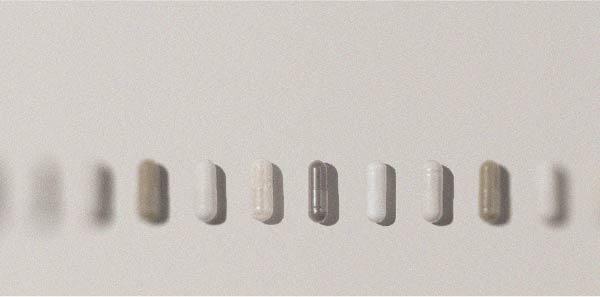Four alternative medicines to discover
Gentle, alternative, fringe … all these adjectives are used to describe non-conventional medicine. Here we take a closer look at the origins and principles of four well-known forms of alternative medicine.

Phytotherapy – harnessing the power of plants
As its name suggests, phytotherapy is the use of plants for preventive or curative purposes. While it has enjoyed a revival in recent years, phytotherapy is actually one of oldest forms of traditional medicine. Indeed Hippocrates, the ‘Father of Medicine’, was extolling its virtues several thousand years ago.
A number of scientific studies have since confirmed the efficacy of phytotherapy and identified powerful phytonutrients such as petasin and isopetasin. These active compounds are found in the plant butterbur (Petasites hybridus) which has antispasmodic, analgesic, anti-inflammatory and anti-allergy properties. Perhaps better known are polyphenols such as resveratrol. Found in many fruits including grapes and apples, such polyphenols are also powerful phytonutrients with antioxidant properties and protective effects.
Aromatherapy - providing the benefits of essential oils
A gentle form of alternative medicine, aromatherapy is considered a sub-category of phytotherapy. It is uniquely based on the use of essential oils extracted from medicinal plants. Obtained by distillation, these essential oils are concentrated liquids containing active principles that are naturally beneficial to health. As they are so highly concentrated, however, they need to be used with caution.
Certain medicinal plants are available in the form of both essential oils and powders, the latter being used primarily in dietary supplements. However, these extracts tend not to share the same characteristics and properties. One such example is cinnamon. Its leaves are distilled to obtain an essential oil with an anti-infection effect, while its bark is ground to a powder for use in various dietary supplements such as Carbo Defense.
Ayurvedic medicine – promoting a balance between body, mind and spirit
You’ve no doubt come across Ayurveda, or Ayurvedic medicine. Recognized as a traditional medicine by the World Health Organisation, it has been used in India for over 5000 years. A gentle form of medicine, it takes a holistic, ‘mind and body’ approach to health and well-being. It is based on the three life forces, or ‘doshas’, called Vata, Pitta and Kapha. According to the founding principles of Ayurveda, an imbalance between these three energies is what leads to the development of disease.
This form of alternative medicine advocates various methods of prevention for maintaining the balance between these doshas, including yoga, Ayurvedic massage and Ayurvedic treatments. The latter are based on medicinal herbs such as gymnema sylvestre and powerful natural remedies such as the legendary detoxifier triphala.
Traditional Chinese medicine for harmony of energy flows
Traditional Chinese medicine is based on a state of harmony between the body’s energy flows. With a tradition of use dating back thousands of years, this ancient form of alternative medicine focuses on maintaining a healthy flow of Qi, which according to Chinese tradition, is the fundamental force that makes up everything in the universe. Any blockage or impairment to Qi means an imbalance in energy flows which is harmful to our health.
In order to maintain or restore the harmony of energy flows, traditional Chinese medicine uses various methods such as acupuncture, massage, energy exercises and medicinal herbs. The Chinese pharmacopoeia is thus one of the richest in the world, featuring many adaptogen plants including ginseng and astragalus, which help improve the body’s ability to withstand certain stress factors and imbalances.
Keywords
2 Days
repeat customer
recommended by my doctor. easy to create an account. Discounts and specials are appreciated. packaging and delivery is dependable. Capsules easy to digest. I've had some some capsules and tablets that are broken inside their bottles.
Kokee
6 Days
Order was shipped on time and packaged…Wonderful Jobs!
Order was shipped on time and packaged excellently.
DMHoge
12 Days
great products and prices
great products and prices
Marie
18 Days
Easy to navigate site
Easy to navigate site, had what I was searching for, good price. easy order-check out
James Tucker
24 Days
My skin is clearing up nicely!
Pretty good for my skin so far.
Christian
27 Days
The new packaging is excellent
The new packaging is excellent - finally! No more squashed boxes and torn envelopes.
GORAN
27 Days
Great Product
Great Product
Larry Garrett
32 Days
Quick shipping
Quick shipping; good price. No issues!
Mary McCarty
33 Days
Thr product is very good and is helping…
Thr product is very good and is helping me on my health. Then is always on time
LUGO Luz
36 Days
Buying was fine
Buying was fine. I had problems with the website not recognizing my login info, and had to call to get it fixed. Other than that, everything was good.
David S. Clark
36 Days
Your super maca and super ginseng are…phenomenal
Your super maca and super ginseng are phenomenal supplements that compliment each other when taking them together. Fantastic feeling of well-being and lots of mid day energy without the crash.
Keith Mason
39 Days
I have had amazing results with every…
I have had amazing results with every supplement I've purchased. I am extremely satisfied with this company
kirstin Torres
39 Days
Fine products
Fine products . They are on the leading edge of online supplements. The only issue -so far-is they sometime run out of subscription items.
Jason Argos
42 Days
The ordering process is very user…
The ordering process is very user friendly and the products always come in a timely manner.
CARTER Rhonda
43 Days
The price for Dr
The price for Dr. Pero's AC-11 is reasonable and in line with his views. (my former colleague). Keep it pure.
CAMPBELL Clayton




